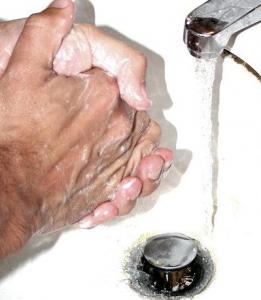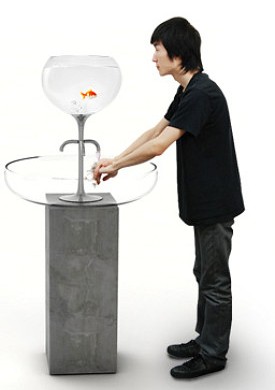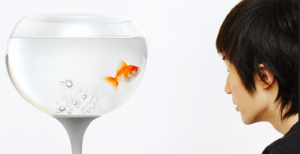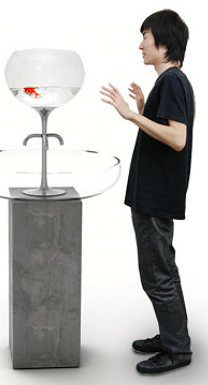
Washing our hands. In the morning. Before and after meals. Usually before bed. Joined with tooth-brushing and a quick gargle. Rinse, spit, smile and gone. It's unconscious--revealing more about your early childhood training than actual hygiene. Lots of water gurgling lazily down the drain.
We also know friends, loved ones who just let the water run as they think about the day, daydream or just beautify. Letting the mirror fog up until they snap back, eyes refocusing as they wipe the mirror clean. Germs. Fear. Beauty. The Madison Avenue trifecta.
Hey, it's such a soothing ritual. It's a lot less expensive than out-call massage, mega-doses of prozac or any of the dozen other serotonin

reuptake inhibitors.
Yan Lu, a young Chinese industrial designer/engineer based in London, has an elegant solution for that ignored water tap. With his coyly named Poor Little Fishbowl Sink, he created a powerful incentive to conserve water: as soon as you turn the faucet on, the fishbowl's water level begins to fall. The longer you wash your hands, the farther the water level drops. If you're overly fastidious, or worse, afflicted with OCD, the fish's water will drop dangerously low. Sooner or later you'll wise up, shutting the water off--motivated by images of a traumatized goldfish gasping on the bottom of an empty bowl. Conservation by B.F. Skinner and the Marquis DeSade.

It reminds users that water is a finite resource, even if goldfish aren't. It also connects our mundane actions to a much bigger picture. Hopefully you quickly understand, which for many people is accepted truth, that we're all stewards of the environment. The bedrock conservationist's message.

In case you're worried--consumed by images of asphyxiation--the water sources for the fishbowl and the faucet are separate. The fish tank's water level is designed to "appear" to fall until you stop washing your hands. But, in case you're distracted or, blind, the bowl will never drain completely.
Once the water stops running, the fish's water will return to it's original level--ready for the next thoughtless bastard to wash his hands after a hard day of over-eating, drinking, smoking, shopping and possible nefarious activities. Just try to wash that guilt away. Not going to happen. You've fallen prey to a conceptual social experiment that would make Stanley Milgram or the editors of National Lampoon proud. A little emotional cruelty for the sake of the planet.
In Yan Lu's words:
Poor Little Fish basin offers an emotional way to persuade consumers to think about saving water, by making consumption tangible.
Check out YanLu.com for a peek into some fascinating work.
Is art an effective way to change people's minds about an issue?



Comments
This is amazing! I want one! To address the question though: I think art has always been a way to address social and societal topics - check out Dadaism for a prime example. As they say, most of communication is non-verbal... and a lot of art is non-verbal communication of ideas and feelings. I think art can have a huge impact on someone's attitude by translating visually and emotionally what is going on in society today.
I agree. I think a lot of artists have been doing very interesting work responding to today's world. <a href="http://inhabitat.com/2010/10/20/amazing-hanging-garden-is-suspended-in-the-sky/" target="_blank">http://inhabitat.com/2010/10/20/amazing-hanging-g...</a> check this guy out.
I think this is a great idea. A friend of mine chastised me about using too much water while shaving at the gym the other day. Leaving it running. I thought about that after reading this. It really is a psychological thing, not wanting that poor fish to die. I'd love one too!
Yeah. It's simple but but it's very effective. Seems like it's temperamentally close to a Monty Python skit. I keep thinking about it too-- kinda stays with you.
Crunchy frog?
Keeping fish in a fishbowl is cruel enough to begin with. Poor little guy has no room to move around and no shelter to hide behind. It doesn't look like it will have sufficient temperature control and water filtration either (Goldfish are cold water fish and incredibly messy). Now you're stressing it out by rapidly changing its water level?
Totally agree.
I agree, as well. We should all take steps to keep our environment safe. It's not just fish that are endangered by things we do daily. Even though most people don't think about global warming as something that is impacting the environment, it is. The more the weather changes, the more it results in various organism groups. Which then can impact people's lives. For example, the warmer winters cause many dormant insect species to wake up from their slumber and go food hunting, which is scarce in the winter months, and they die off. This happens with wasps and many other insects. The problem is that even the smallest bug is of importance in the grand scheme of life and food chain. If, let's say wasps, disappear from the planet, soon afterwards the planet will be swarmed with other insects that have no benefit, but are nothing more than pests. And it's the same with our seas and oceans, the goldfish and more of the submarine life is put in danger because of people's actions, and we are the ones who have to find a solution to the problem. Amber Morris, Pest Exterminator and Consultant at https://www.247pestcontrol.co.uk/